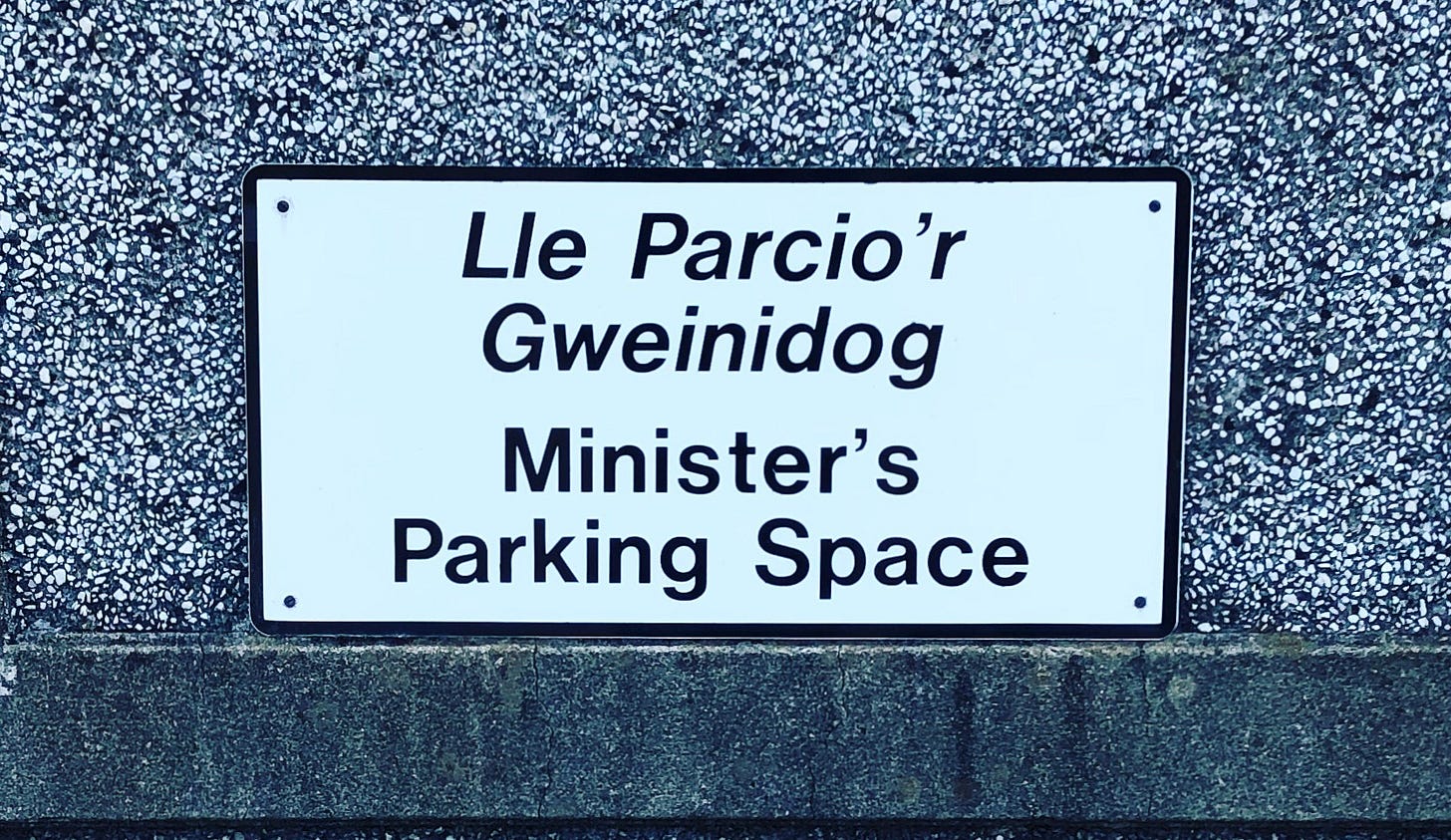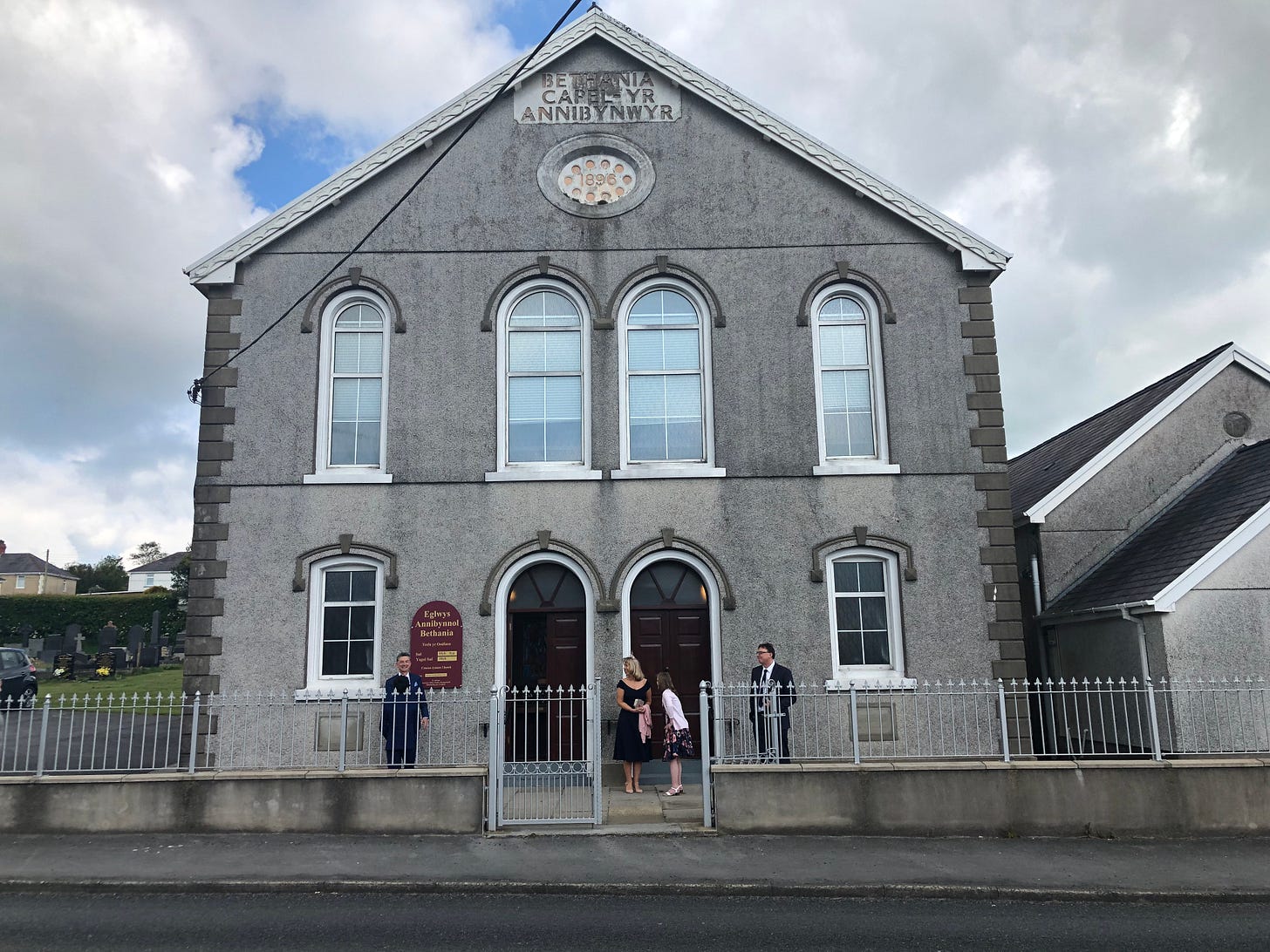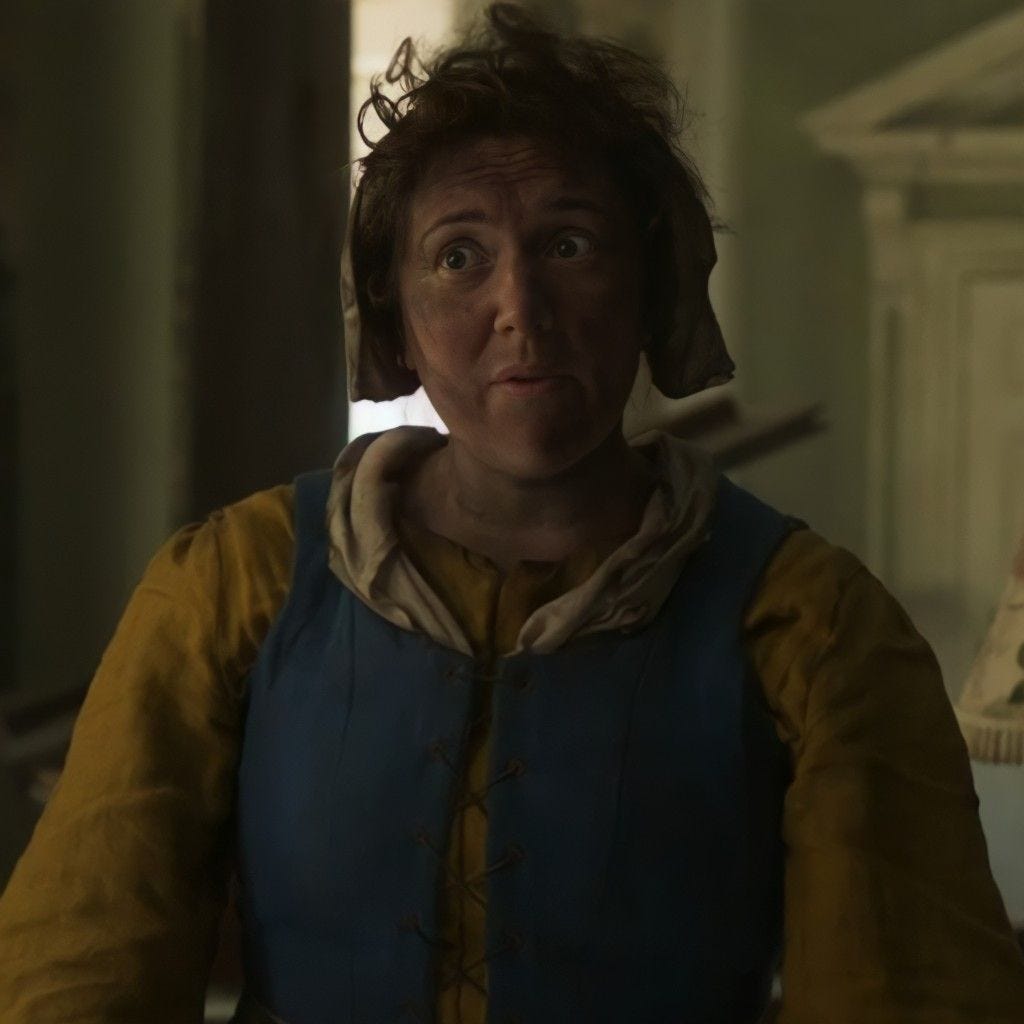One hundred years ago in 2019 I traveled to Abertawe, Wales, my husband’s hometown. I had just been ordained and had started my first solo parish ministry at a Unitarian Universalist fellowship in Washington State. I didn’t think it was a big deal, being a minister, because I had seen the reality of the process. But I appreciated when other people thought so. Most often, they didn’t. Most often, if it came up, I found myself assuring them that yes, I was a really real minister for a really real congregation, and no, I hadn’t just printed out a certificate on the internet (though to be fair, I’d done that once, too.) Sometimes it felt like I was also trying to convince myself.
We were in Wales for a chapel wedding, in one of the oldest chapels in South Wales. The Eglwys Annibynnol Bethania chapel in Upper Tumble. The liturgical language they speak in their services is such an ancient form of Welsh that even Welsh-speaking people struggle with it.
Chapels in Wales are non-conformist, which means they aren’t part of the state religion, the Church in Wales. They are what my atheist husband calls, “some other form of Jesus.” They are historically working class, built and financed by the people, who elect their own Welsh religious leaders. The Church in Wales, alternatively, is Anglican, English-speaking, and until the early 20th century controlled by the Church of England.
Throughout the 18th and 19th centuries, nonconformist chapels were the hub of Welsh life. They are a large part of what kept the Welsh language alive in the face of English oppression. In schools and workplaces the Welsh language was banned. But at chapel, Welsh people could speak and pray freely.
Because of this history of nonconformist religion in Wales, when I told my Welsh in-laws I had been ordained, they took it in stride. When I explained I was a Unitarian minister, they understood. Unitarians in Wales are one of the smaller nonconformist religions, but they are well known for their outspoken liberalism. My own Welsh ancestors came to the United States from an area of Wales dubbed the “Black Spot” because of its prevalence of Unitarian chapels.
Their main heresy? Unitarians believed Jesus was sent by God but wasn’t actually God.
In the 20th century, Unitarians in the United States who had fled the religious oppression of Europe (including Wales) combined with a similar religion, Universalism, to form a distinctly American version of nonconformist Christianity. Unitarian Universalism (UU) evolved through the 20th and 21st centuries into a sort of congregationalist, pluralist, progressive, humanist, queer, activist, spiritual-but-not-religious religion.
Is it Christian? people ask. It’s not Christian but it’s not not Christian. I say.
UUism was the funky nonconformist religion that took me in when I needed spiritual community and wanted to bring all my beliefs with me, including the contradictory ones. Unitarian means we are all connected, part of one interdependent web of life. Universalism means that every part of this web of life is holy and sacred. Which means that every part of every one of us is holy and sacred. Which means every part of me is holy and sacred. (If you need a mantra for the week ahead, that’s a good one.)
Every part of me is holy and sacred.
When I left my congregation in 2022 after just three years as a parish minister, I was fully gutted. I had failed my faith and it had failed me. I wasn’t even sure I was a UU anymore. Nothing felt holy or sacred, and I sunk into despair.
I went quiet for a while. I tried posting on Substack but I was so angry every post felt like a might delete later. My friend gave me a job cleaning frozen yogurt machines at her local shop. I hung a shingle out on Rover and used my pastoral skills to babysit dogs. I started taking antidepressants.
Then a minister friend from another nonconformist faith (the congregationalist United Church of Christ) asked me to apply to be the office manager for her church, where I had once served as a ministerial intern. I desperately—maybe not so secretly—longed to be back at church. “Office manager etc.” was the job title. It was only ten minutes from my house. And the congregation was filled with people I loved and who loved me.
Every part of me is holy and sacred.
Administration is an under appreciated form of ministry. You’re responsible for everything and nothing, blessed with a ministry but no ministry title, where people constantly call you “the secretary.” But it was a chance to see if I was done with God. And whether God was done with me.
Spoiler: God’s never done.
I am here again, having faith again, writing again, parking my ministry at Substack because love heals. My friend and her UCC congregation believed in me when I didn’t believe in myself, gave me a meaningful ministry when my nerves were shot and my heart was broken, and welcomed me when I felt lost and abandoned. It sounds miraculous but healing is seriously as simple as Time + Love. Big Holy & Sacred Love.
And they reminded me through that Love, no matter where I am called to go or what job I am called to do, I’m a minister. And a writer. And called again and again to the nonconformist spiritual life. A faith inherited from people who found a way when there was no way. Who spoke their language and built their churches the way it made sense to them. This funky little Substack feels like an excellent place for me to carry on that rebellious tradition.
I’m not going to try to convince people anymore of my credentials as a minister or that my religion is really real or that I’ve got something to say. What matters is my willingness to show up and share my faith as a congregationalist, pluralist, progressive, humanist, queer, activist, spiritual-but-not-religious religious person. Here on Substack.
Every part of me is holy and sacred.
It’s a tough phrase to say with conviction during those times when everything falls apart, despair and insecurity take hold, and the chaos and pain of being human on this planet overwhelms. But honestly and sincerely, we don’t need to feel it deeply for it to be true. We just hold our hand to our heart for a couple seconds and give the reality of our sacred holiness a chance to exist. For just a moment we dare to believe that we can fail, we can heal, we can lose love and find it again, we can be all of who we are or more or less and try again, and through everything the spark of the divine still resonates within us. The light never goes out. The language of our hearts still calls even when we don’t always hear it. All we have to do to answer is just be.








So much love for you!